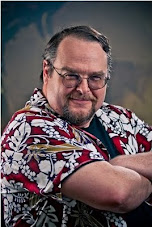Let me be clear: I have mocked opera in the past. I have done so publicly and in private communications. I have taken money for mocking opera (Tymora's Luck being but one example) and have encouraged others to mock it. Yet, I had never seen an opera live. Now, thanks to IronyMaiden, who proposed this, I have (CORRECTION: Monkey King proposed it - Irony Maiden did the legwork. Thanks to both). So when in the future I use the phrase "an aria that sounded like a phaser on overload" you know I speaking from a strong knowledge base.
Actually, I had a wonderful time. Attendees were Irony Maiden and her husband Chris, Shelly in Seattle, The Monkey King and Scarlettina. First we did dinner at a new place called Crow in a renovated block near the Seattle Center, a few doors up from Pannos Klepikos. The food was great, and we arrived early because the reviews warned that the kitchen was a little slow. The staff must have read the same reviews, because they were delightful and prompt and left enough time for desert and a leisurely walk over the McCaw Hall.
The new opera hall is itself amazing - a massive hall with incredible sound qualities. We were all of three rows away from the back row on the second balcony, and I could hear billiard balls clicking on the pool table on the stage (which was, oh, three miles distant). The seats were narrow and uncomfortable for a three hour marathon, and I regret not bringing stadium binocs, but the sound, ah, the sound, was fantastic.
The production itself had a few big glitches. The superscriptor (a large screen over the stage showing English lyrics) was on the fritz for the opening scene, leaving the unschooled viewer to figure out for themselves what is going on (apparently, in opera, as opposed to theatre, you go to show knowing what the story is already, the better to enjoy the performance). There was a glacial age of a scene change in the first act, amazing because the opera is all of 500 yards from the masters of scenery at the Seattle Rep. And one of the lesser parts had laryngitis and had to be voiced from the orchestra pit. But past those physical limitations, the preformance was absolutely brilliant.
Here's the plot: Rigoletto is an Evil Clown, the hunchbacked jester serving a powerful, womanizing master. The Evil Clown is a character "type" that has almost disappeared from modern plays, but is kept alive in opera. Rigoletto is cruel to others because his master, the Duke of Mantua, protects him. Rigoletto is petty, insulting, vindictive, and clueless about his own faults - as a modern analogy, think of George Costanza from Seinfeld. Everything is someone else's fault. Even the terrible things that happen to him here are not his fault, but rather the result of a curse placed upon him by the father of one of the women the Duke has seduced.
The bright spot in Rigoletto's life is his sheltered daughter, Gilda, who is being secretly romanced by the Duke. The Duke's courtiers, a mob of partygoers, think Gilda to be Rigoletto's mistress, so they kidnap her, making Rigoletto the fool in the process, and take her back to the Duke's court. Rigoletto swears vengeance against the Duke, and hires an assassin to do away with his master. Gilda, out of love for the Duke (who is clueless as to her devotion and moved on to new conquests), sacrifices herself to the assassin's blade, and dies in her father's arms.
That's the framework, and it is usually set in Italy of the 1600's. This production is daring (for opera) in that it moves the time frame up to 1930s Italy under Mussolini. The music and libretto are unchanged, but the move strengthens a number of points that might otherwise be lost on those without a background of Renaisance Italy. The totalitarian concept of "Power Justifies All" is embodied in the callous Duke, who takes what he chooses and escapes the consequences. So too the mob of partygoers embody the idea of the
And, in moving it forward to the 1930's, they show that this opera is noir, of the same blood as The Big Sleep. Here we have amoral and immoral characters operating in an uncaring and corrupt universe. Gilda is the only pure soul, -she transforms over time and makes real choices, and is punished for it. The rest of the characters are fallen creatures, totally human. The moral at the end of it all? "Forget it, Rigoletto, it's Chinatown."
The performances were incredibly strong - Frank Lopardo as the Duke and Kim Josephson in the title roll as Rigoletto provided were excellent. Norah Amsellen topped the others as Gilda, her voice transcedent. Most of all, in addition to singing, they all acted as well, making the entire production more human and accessible. I am glad I went, and encountered this work as my first opera experience.
Opera Noir. More later,


